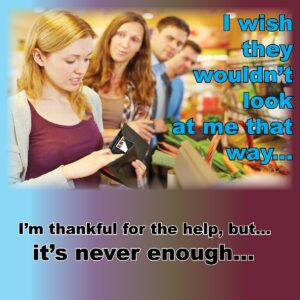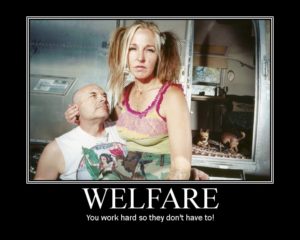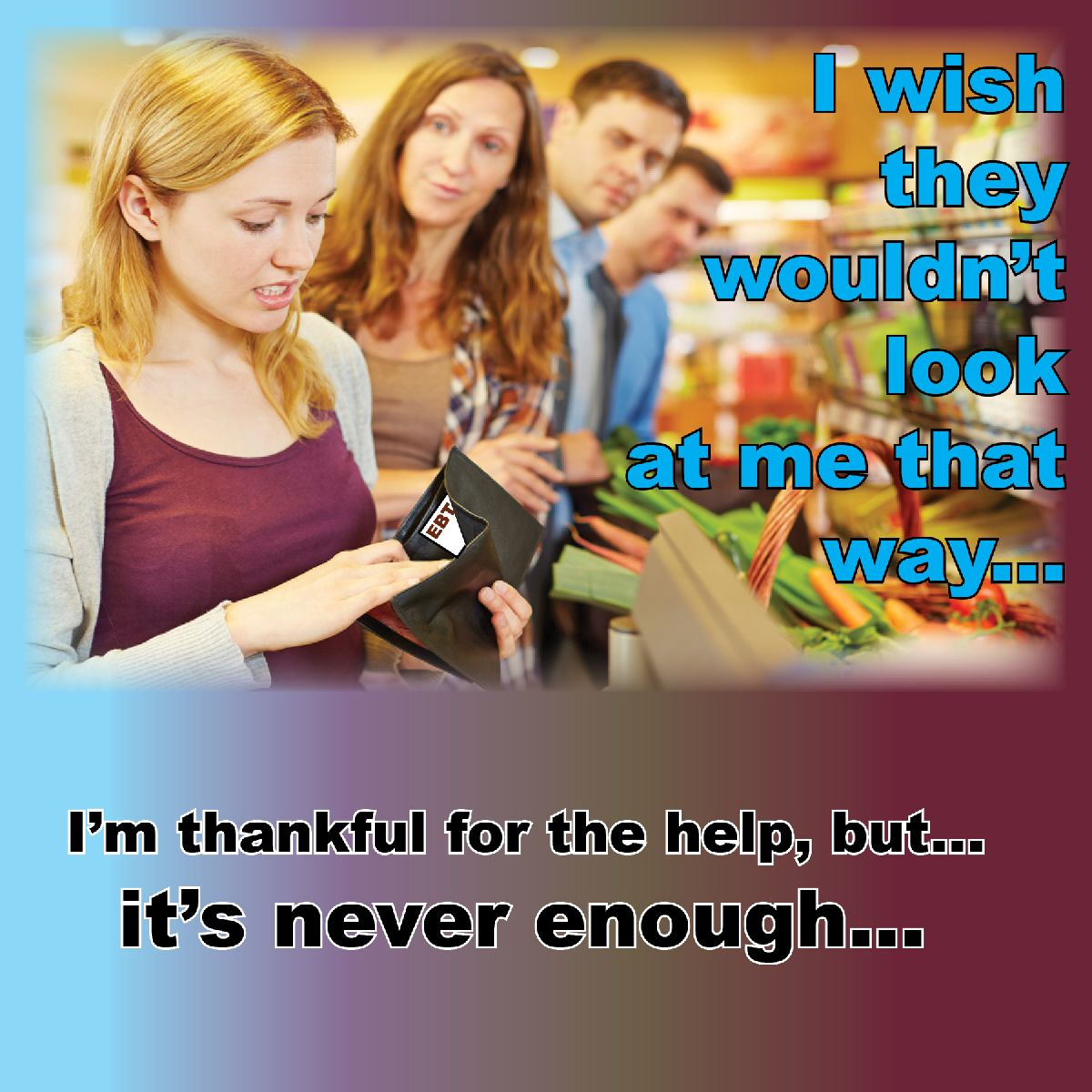By Jeremy Reynalds, Ph.D.
Founder and CEO
Joy Junction Inc.
 Insults and demeaning statements can be a major part of what it means to be homeless, hungry and obviously needy.
Insults and demeaning statements can be a major part of what it means to be homeless, hungry and obviously needy.
A recent article in the British Daily Mail said that “welfare addicts” are costing Australians billions of dollars.
According to one study, the annual price tag for welfare here in the U.S. is $152.8 billion.
For the sake of comparison, Australia’s population is just over 24 million , while America’s is over 324 million
While the article was admittedly about Australians, there’s definitely a mean anti welfare sentiment here in some quarters.
One visitor to that page wrote (sic) “No one likes working hard for money then having to giving it to bums who dont want to get jobs! those lazy people are what ruins america!”
I found another similarly nasty sentiment. 
One company even has a “welfare addicts” bumper sticker.
With all this in mind, we asked some of our guests at Joy Junction (promising them anonymity) this question.
“If you receive a government benefit such as SNAP (food stamps) or other funds, what would you say to people who think you’re ‘raking in the bucks,’ and are a ‘welfare addict?’ Please share the reality of living on government benefits of whatever sort, and how difficult it is/has been.”
Someone who received food stamps a couple of years ago said they never imagined being in that situation.
That person continued, “I would say to those who are critical of people that receive benefits that in the last few years the economy has changed, and circumstances happen that you have no control over and the only option is to ask for assistance to survive.”
Another person described the grueling reality of being poor and receiving government assistance.
“It sucks to be homeless and all that goes with it, like riding on two buses to get out of the South Valley.”
However, at least a little hope is on the horizon. “I was introduced to a job developer yesterday who will help me find a part time job. As a 70 year old (or nearing it), I already have social security, and I … will apply for food stamps again. I worked hard all my life.
“With God’s help, I’ll be able to join Him in heaven after my work on earth is finished and He decides to call me home.”
Another individual talked about the difficulties faced by convicts after being recently released from prison.
“Most people will not even look at hiring a convicted felon. I have a family to support and need a hand up … Until you have walked a mile in my shoes, make sure you can make a mile in your own.”
This person was grateful for the assistance, but said it will not become a way of life. And for those who criticize?
“I think people need to stop comparing and wanting what they don’t have and thank God for what they do have. (They should be) good stewards of what God has given them, and let God be the judge.”
The individual had challenging words for the way government welfare programs are administered.
“Government programs don’t help you to get ahead. They want you to stay at income poverty level, or they cut you off. Then you are forced to depend on them again.”
This woman said she receives social security disability income and other benefits.
She commented, “No, I am not raking in the bucks. I am paying all of my old bills. Bills don’t disappear when you become disabled. The programs make it possible for you to live but not over spend at all. You learn how to live hand to month.”
Another person commented that no matter your income situation, the government is always somehow involved.
“We need to start thinking about the big picture, and ask ourselves why the government does what the government does. Why do we complain about lifting people up when they need help, but yet we give our money away to events that benefit noone except to make the rich richer?”
I also wanted to see what our Joy Junction Facebook fans thought, so I posed this question about the Daily Mail article.
“Isn’t it somewhat demeaning to call people ‘welfare addicts?’ It doesn’t do anything to address the issue, only give an excuse to justify not helping. The article also fails to adequately address mental health issues and emotional traumas that could make people emotionally and physically retreat and thus unable to work. Do you think we have ‘welfare addicts’ (so called) here, and if so, what is the answer?”
People were quick to respond. Here’s a sampling of their thoughts.
Michael said we need welfare and food stamps so people can eat, and have a place to sleep.
Patricia said that people use demeaning terms when they lack empathy.
She continued, “Compassion should be first and give from one’s heart. God will judge, so it’s not our job to put labels when we know nothing of their lives.”
Billie said that people give her “trouble” when she gives money to the homeless. They say they use the money for bad indulgences. My response is, and always has been, ‘I give from my heart. What that person does with it is between them and God.’”
Crystal had an interesting perspective, saying that “welfare culture” is definitely a problem.
She added, “When it’s how you grew up or when your friends/family are pressuring you to accept government assistance, it’s easy to just go along with it. I’ve had at least three or four people telling me we should sign up for WIC. We’re not rich, but we’re managing well enough. I’ll leave the money for those who truly need it.”
Tracy said she doesn’t think that calling people welfare addicts is a demeaning term at all. However, in her opinion we have created what she termed a “dependent class.”
She continued, “Hard working folks down on their luck should get a hand up, However, you have to admit there are many that don’t want a hand up; they simply want a hand out. I absolutely believe we should help those that can’t help themselves, however I don’t believe in helping those (who) won’t help themselves.’
There’s only one problem with that scenario, Tracy. If we fail to assist those who for whatever reason are unable to help themselves, what do we do with them? Leave them out on the streets to starve, put them in jail? Take your answer to its logical conclusion, and it doesn’t work.
Bob had a similar answer, saying that while not everyone is a welfare addict, there are some.
He continued, “We’re talking about those who abuse the system. These folks are lazy. Not those who have viable injuries, mental issues, and those who are having a tough time like abused women and children. Come on, you have to admit there are some who game the system. Weed them out! They’re making those who need it look and feel bad.”
So Bob, if what you’re saying is right, what do we do with those who “game the system?” Jail, hospital, streets? Not helping is not an answer. What is the solution?
Rachel said she believes the system as it is doesn’t really help in the way it should.
She continued, “There are many people who need help and can’t get it, because they earn just above the (cutoff) level. I feel the system is designed to keep people down and not help them up.”
Billie made perhaps the most important point of all, reminding us that welfare recipients can only receive assistance for five years.
“Doubt that has much dependency attached to it … Truth of all of this is the majority of us are only one paycheck away from being where these individuals are at.”
Billie is exactly right, with welfare assistance being limited to five years, and in some states less than that.
President Bill Clinton campaigned on a pledge to “end welfare as we know it.”
The Atlantic reported that the law replaced AFDC (Aid to Families with Dependent Children) with TANF (Temporary Aid to Needy Families—“temporary” being the key word) mandated people could receive no more than five years of government benefits in a lifetime. States could, however, set their limits lower and many did, with some imposing a two-year lifetime limit.
“It required a certain percentage of welfare recipients in states to be working, and said that those who couldn’t find jobs would have to participate in community service or get vocational training. Those who didn’t work or volunteer would eventually be kicked off the welfare rolls.”
So before talking disparagingly about those on welfare, or making faces at the grocery check out line if you happen to see someone buying food with their EBT card that you don’t approve of, think about it. Regardless of what you might think, poverty hurts.
There’s much more than appears to the story of someone receiving food stamps or other forms of government benefits, and neither you or I know the half of it.


